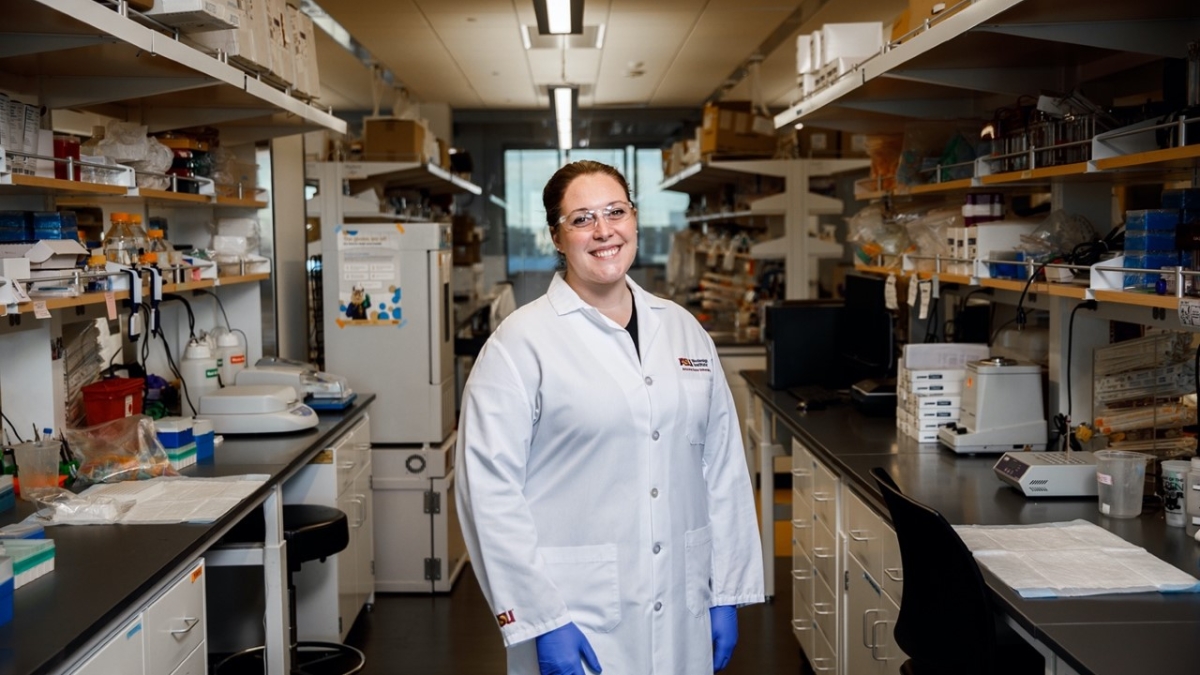Travel grants open up a world of opportunities for student researchers

With the help of a Student Travel Grant, graduate student Savannah Tallino was able to attend the Society for Neuroscience conference in San Diego, California.
Successful scientists don’t spend all of their time in the lab conducting experiments — a crucial part of being a scientist is also attending scientific conferences.
These events provide researchers with the opportunity to collaborate on projects and learn from each other, as well as learn about the latest scientific discoveries in their field.
For students pursuing scientific careers, conferences can provide tremendous opportunities to grow as young professionals.
“Traveling to scientific meetings and engaging with others in the field builds a network as students prepare for postdoctoral positions and jobs,” says Stephen Munk, deputy director of the Biodesign Institute at Arizona State University. “Students also have the chance to discuss the work of others and learn what others are doing and why it is important. Presenting one’s work and getting feedback is a critical part of development as a scientist.”
Unfortunately, traveling to a conference in another city, state or even country is out of reach for many college students. According to the American Psychological Association, more than a third of college students in the United States cannot afford stable housing and abundant food, never mind professional travel.
More than 400 students engage in research at the Biodesign Institute. The Biodesign Travel Fund awards Student Travel Grants that allow selected students to attend scientific conferences pertinent to their research. Students are able to present and learn more about their research area as well as meet and network with other scientists in their field.
“Some of us aren't able to go to conferences unless we're able to find external funding,” says Savannah Tallino, a student in the School of Life Sciences Interdisciplinary Graduate Program in Neuroscience.
With the help of a Student Travel Grant, Tallino was able to attend the Society for Neuroscience conference in San Diego, California.
“Going to conferences like this is one of the best ways to meet new people who are in the same field as you and exchange ideas, and also forge new relationships that you can leverage later on, so that you can apply for grants together or email each other when you're having trouble with a technique that the other lab has specialized in,” she says.
By attending the conference, Tallino was able to gain valuable insight on how to progress as an advanced researcher in her field and continue to pursue her goals.
“I had the ability to meet with people in my field, people whose papers I had read and really admired, interact with them and learn from them,” she says.
Sofia Rocha, a microbiology PhD student who works as a graduate assistant in the Biodesign Center for Fundamental and Applied Microbiomics, will be attending the American Association for Dental, Oral, and Craniofacial Research Annual Meeting and Exhibition in Portland, Oregon.
Rocha says the meeting will be important “to help with any troubleshooting that we may have with our own personal projects by learning other insights from other protocols that they might have that we're not used to.”
Since it was created in 2011, The Biodesign Travel Fund has helped nearly 100 students like Tallino and Rocha attend scientific conferences from Seattle to Switzerland.
The Biodesign Travel Fund relies on support from generous donors. Learn more about how you can help provide life-changing opportunities for ASU student researchers.
Written by Logan Alvarado
More Sun Devil community

A champion's gift: Donation from former Sun Devil helps renovate softball stadium
Jackie Vasquez-Lapan can hear the words today as clearly as she did 17 years ago.In 2008, Vasquez-Lapan was an outfielder on…

Student-led business organization celebrates community, Indigenous heritage
ASU has seen significant growth in Native American student enrollment in recent years. And yet, Native American students make up…

Remembering ASU physical chemist Andrew Chizmeshya
Andrew Chizmeshya, a computational chemist and materials scientist whose work spanned over three decades at Arizona State…

